新概念第二册L1
新概念英语第二册L1

It's none of your business!
business • n.生意,商业,交易. business center 商业中心 business man 商人 he's doing a great business. 他生意做得不错。 The bank has opened for business. 该银行已经开业。 • n. 事务,事情,责任,使命 What is your business here? 你来这有何贵干? It's my / your / our business. 这是我/你/我们的事。 It's none of your business! 这根本不关你的事! It's none of = it's not , 只是前者语气更重。
Notes on the text
Last week I went to the theatre.
go to the theatre 去看戏 注意这个to必须加上去,表示去某一场所的 特定活动,类似的还有: go to the cinema / show 去看电影 / 去看表演 go to the bank / post office 去银行 / 去邮局
angry /'æŋgrɪ/
v. 生气的
attention /ə'tɛnʃən/
n. 注意 May I have you attention please? 请大家注意了。 pay attention to sth / doing sth
bear /bɛr/ v. 忍受 rudely /'ru:dli/ adv. 粗鲁地,粗鲁地
Lesson 1
A Private Conversation
NCE2 L1新概念英语第二册L1

NCE L1 A private conversation私人谈话看一看the London Eye看一看the River Thames看一看Tower Bridge看一看Westminster Bridge看一看Big Ben找一找the London Eyethe River Thames Tower BridgeWestminster Bridge Big Ben看一看(环球剧场)Shakespeare’s Globe Theatre•pr i vate 私人的↖↖↖↖Con ver sa tion get into the conversation with have a converation with private conversationTh ea t er请坐下的三种说法:➢sit down, please;➢take your seat, please;➢Beseated,please.an gryangrily(副词)be angry with【When angry, count a hundred】.生气的时候数数到100.a t ten tionPay much attentionPay a little attentionPay no attention•注意了啊!•在十点钟•(准时集合)•立正bear•Vt. 忍受,承受I can’t bear it! • 1. n. 熊• 2. n. 鲁莽的人;笨拙的人• 3. n. 【美】【俚】佼佼者He is a bear at English.business •交易,生意•事情•公事,商务↓↓↓Busness is business It’s none of your business A: What do you do?B: I do business ←逼死你→enjoy 欣赏;享受;喜爱[+v-ing]I enjoy the party very much. 我非常喜欢这次聚会。
新概念2-L1-A private conversation

bear v. (bore, borne) = stand 容忍,忍受;忍耐;承受 The pain was almost more than he could bear. 这样的痛苦几乎使他受不了。 How can you bear to eat that food? 你怎么能吃得下那样的东西?
none of one’s business 不关某人的事,与……无关 My private life is none of your business. 我的私生活与你无关。 The things most people want to know about are usually none of their business. 大多数人想知道的事情通常是跟他们毫不相干的事情。 -Who’s that letter from? 那封信是谁寄来的? - It’s none of your business.
2. 表示过去的状态、感觉及心理活动的静态动词(如:be, like, love, hate, fear, own, hear, see, know, want, notice) 可用于一般过去时,但通常不用于进行时。 I hate it when a man spoke with his mouth full of food. 我讨厌人们说话时嘴里满含食物。
拒绝;调小(音量) 交还;上交 打开(煤气、自来水、电灯等) 调大(音量);出现 向……求助 关闭(煤气、自来水、电灯等)
in the end 最后;最终相当于at last或finally
He tried many different jobs; in the end he became a postman. 他做过多种不同的工作,最后当了邮递员。
(完整版)新概念第二册1——10课课文
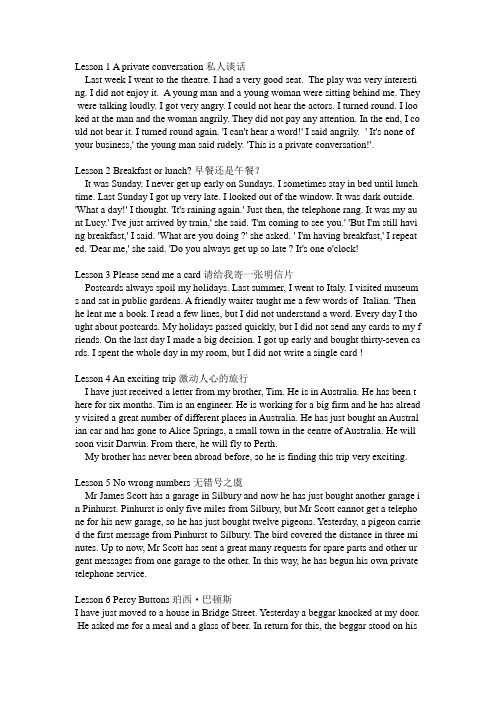
Lesson 1 A private conversation 私人谈话Last week I went to the theatre. I had a very good seat. The play was very interesti ng. I did not enjoy it. A young man and a young woman were sitting behind me. They were talking loudly. I got very angry. I could not hear the actors. I turned round. I loo ked at the man and the woman angrily. They did not pay any attention. In the end, I co uld not bear it. I turned round again. 'I can't hear a word!' I said angrily. ' It's none of your business,' the young man said rudely. 'This is a private conversation!'.Lesson 2 Breakfast or lunch? 早餐还是午餐?It was Sunday. I never get up early on Sundays. I sometimes stay in bed until lunch time. Last Sunday I got up very late. I looked out of the window. It was dark outside. 'What a day!' I thought. 'It's raining again.' Just then, the telephone rang. It was my au nt Lucy.' I've just arrived by train,' she said. 'I'm coming to see you.' 'But I'm still havi ng breakfast,' I said. 'What are you doing ?' she asked. ' I'm having breakfast,' I repeat ed. 'Dear me,' she said. 'Do you always get up so late ? It's one o'clock!Lesson 3 Please send me a card 请给我寄一张明信片Postcards always spoil my holidays. Last summer, I went to Italy. I visited museum s and sat in public gardens. A friendly waiter taught me a few words of Italian. 'Then he lent me a book. I read a few lines, but I did not understand a word. Every day I tho ught about postcards. My holidays passed quickly, but I did not send any cards to my f riends. On the last day I made a big decision. I got up early and bought thirty-seven ca rds. I spent the whole day in my room, but I did not write a single card !Lesson 4 An exciting trip 激动人心的旅行I have just received a letter from my brother, Tim. He is in Australia. He has been t here for six months. Tim is an engineer. He is working for a big firm and he has alread y visited a great number of different places in Australia. He has just bought an Austral ian car and has gone to Alice Springs, a small town in the centre of Australia. He will soon visit Darwin. From there, he will fly to Perth.My brother has never been abroad before, so he is finding this trip very exciting. Lesson 5 No wrong numbers 无错号之虞Mr James Scott has a garage in Silbury and now he has just bought another garage i n Pinhurst. Pinhurst is only five miles from Silbury, but Mr Scott cannot get a telepho ne for his new garage, so he has just bought twelve pigeons. Yesterday, a pigeon carrie d the first message from Pinhurst to Silbury. The bird covered the distance in three mi nutes. Up to now, Mr Scott has sent a great many requests for spare parts and other ur gent messages from one garage to the other. In this way, he has begun his own private telephone service.Lesson 6 Percy Buttons 珀西·巴顿斯I have just moved to a house in Bridge Street. Yesterday a beggar knocked at my door. He asked me for a meal and a glass of beer. In return for this, the beggar stood on hishead and sang songs. I gave him a meal. He ate the food and drank the beer. Then he p ut a piece of cheese in his pocketand went away. Later a neighbour told me about him. Everybody knows him. His nam e is Percy Buttons. He calls at every house in the street once a month and always asks for a meal and a glass of beer.Lesson 7 Too late 为时太晚The plane was late and detectives were waiting at the airport all morning. They were e xpecting a valuable parcel of diamond from South Africa. A few hours earlier, someon e had told the police that thieves would try to steal the diamonds. When the plane arri ved, some of the detectives were waiting inside the main building while others were w aiting on the airfield. Two men took the parcel off the plane and carried it into the Cus toms House. While two detectives were keeping guard at the door, two others opened the parcel. To their surprise, the precious parcel was full of stones and sand! Lesson 8 The best and the worst 最好的和最差的Joe Sanders has the most beautiful garden in our town. Nearly everybody enters for 'T he Nicest Garden Competition' each year, but Joe wins every time. Bill Frith's garden is larger than Joe's. Bill works harder than Joe and grows more flowers and vegetables , but Joe's garden is more interesting. He has made neat paths and has built a wooden bridge over a pool. I like gardens too, but I do not like hard work. Every year I enter f or the garden competition too, and I always win a little prize for the worst garden in th e town!Lesson 9 A cold welcome 冷遇On Wednesday evening, we went to the Town Hall. It was the last day of the year and a large crowd of people had gathered under the Town Hall clock. It would strike twelv e in twenty minutes' time. Fifteen minutes passed and then, at five to twelve, the clock stopped. The big minute hand did not move. We waited and waited, but nothing happ ened. Suddenly someone shouted, 'It's two minutes past twelve! The clock has stoppe d!' I looked at my watch. It was true. The big clock refused to welcome the New Year.At that moment everybody began to laugh and sing.Lesson 10 Not for jazz 不适于演奏爵士乐We have an old musical instrument. It is called a clavichord(翼琴). It was made in Germany in 1681. Our clavichord is kept in the living-room. It has belong to our family for a long time. The instrument was bought by my grandfather many years ago. Recently it was damaged by a visitor. She tried to play jazz on it! She struck the keys too hard and two of the strings were broken. My father was shocked. Now we are not allowed to touch it. It is being repaired by a friend of my father's.。
新概念英语第二册L1

I did not enjoy it (the play).
• look at 和 see 的区别,与 listen to 和 hear 是一 样的. look at 强调看这个动作本身, see 强调结 果,表示看到了 Did you see Johnson yesterday? He is looking at a picture. 他正在看美女的时候,却看到了他的爸爸。 • watch 观看 watch the show / TV • 注意看书是 read the book!
• 在英文中,听到某人直接用hear sb. Can you hear meo表示动作 He's not listening to me. 我正在听音乐。 我听到了他的脚步声。
I looked at the man and the young woman angrily.
attention /ə'tɛnʃən/
n. 注意 May I have you attention please? 请大家注意了。 pay attention to sth / doing sth
bear /bɛr/ v. 忍受 rude /'ru:d/ adj. 粗鲁的
Last week I went to the theatre.
enjoy在英文中是一个相当常用的词,表示享受,喜欢 • enjoy sth I did not enjoy the food / book / class. • enjoy doing sth I enjoy surfing on the internet. I enjoy having conversations with Mr. Johnson. • I enjoy this book = I enjoy reading this book.
新概念英语第2册L1私人谈话

私人谈话★private adj.私人的it's my private letter/house ;private school:私立学校public:公众的,公开的public school ;public letter 公开信;public place :公共场所privacy:隐私it's a privacy. adj.《Private Ryan》private soldier:大兵private citizen 普通公民private life:私生活★co nversation n.谈话subject of conversation:话题talk.可以正式,也可以私人的conversation. 比较正式一些let's have a talkThey are having a conversation.conversation 用的时候比talk正式,意思上往往不非常正式.talk:可正式可不正式dialogue:对话China and Korea are having a dialogue. 正式chat: 闲聊gossip:嚼舌头have a + talk/chat/dialogue/conversation/gossip 名词变动词★theatre n.剧场,戏剧cinema: 电影院★seat n.座位have a good seat(place)take a seat : 座下来,就座take your seat/take a seatIs the seat taken? 这个座位有人吗?no/yessit sit down ,pleaseseat take your seat,pleasebe seated,please 更为礼貌seat是及物动词,后面有宾语sit是不及物动词,后面不加宾语seat后面会加人; seat sb; seat him; seat:让某人就座sithe is sitting there.you seat him;〖语法精粹〗4.When all those present(到场者)_D_ he began his lecture.(重点题)A.sitB.setC.seatedD.were seaedsit,sit down; seat,be seated;take a seat★play n.戏★loudly adv. 大声的★angry adj. 生气的cross=angry ; I was angry.He was cross.annoyed: 恼火的;I was annoyed. I was angry/cross. I was very angry.be blue in the face; I am blue in the face.★angrily adv. 生气的副词修饰动词★attention n. 注意Attention ,please. 请注意pay attention :注意pay attention to : 对什么注意You must pay attention to that gril. pay a little attention :稍加注意pay much attention :多加注意pay more attention :更多注意pay no attention :不用注意★bear(bore,borne) v. 容忍bear,standI can't bear/stand youendure :忍受,容忍put up with :忍受I got divorced.I could not put up with himbear/stand/endure忍受的极限在加大put up with=bear=standbear n.熊white bearbear hog :热情(热烈)的拥抱give sb a bear hug★business n. 事business man :生意人do business: 做生意go to some place on business:因公出差I went to Tianjin on business. thing 可以指事情,也可以指东西It's my business 私人事情it's none of your business★rudely adv. 无礼地,粗鲁地rude adj.Last weekgo to the theatresee a film,go to the cinemago to the +地点表示去某地干嘛go to the doctor's 去看病go to the dairy 去牛奶店go to the + 人+ 's 表示去这个人开的店go to the butcher's 买肉go to school: 去上学go to church: 去做礼拜go to hospital(医院):去看病go home; 跟home相连一定表示没有事情可做,回家休息I am at homeenjoy, enjoy oneself:玩的开心enjoy+sth :喜欢,从当中得到一种享受I like something very much./I love something.I enjoy the class. I enjoy the music.enjoy the dinner/film/progeam/gamewere sitting :当时正座在过去进行时态:过去的某个时间正在发生的动作一个故事的背景往往用进行时态描述I+be+v(ing)The girl was reading a book in the garden.A boy came to her.got :变得,表示一种变化,got angryI am/was angry 是一个事实I got angry:强调变化过程It is hot.It got hot.got取代be动词,got是一个半联系动词,可以直接加形容词说话的时候喜欢用缩略.I'm not,he isn't,they aren't写的时候会说:I am not,he is not,they are notI didn't do sth,I did not do sthhear:听见hear+人:听见某人的话I could not hear you.Beg your pardon?I couldn't hear you./I couldn't hear a word./I couldn't catch your word.I couldn't hear you clearly./I couldn't catch your words.Beg your pardon? /I couldn't catch your words.turn round:转头pay any attention表示注意,pay attention; 对什么加以注意,pay attention to sthnot any=noI could not bear it./you./the noise. I can't hear a word.美音:肯定.I can,否定,I can't,只能根据上下文来定hear a word, a word 等于一句话He didn't say a word.May I speak to Jim?/May I have a word with Jim?It's none of your business./None of your business/It's my business.I couldn't bear you.This is private conversation!private :私人的,不想与别人共享【KEY STUCTURES】关键句型Word order in simple statements: 简单陈述句的语序陈述句一定是有主语,有动词,有宾语,有句号6 1 2 3 4 5 6 when? Who? Action Who? How? Where? When?Which? Which?What? What?Last week1 ---主语一般有名词或代词构成2 ---谓语由动词充当3 ---宾语4 ---副词或介词短语,对方式或状态提问,往往做状语I like her very much5 ---地点状语6 ---时间状语可以放在句首或句末I like the girl very much in Beijing last year. 简单陈述句一定不能少的是主语6. Immediately left he.He left immediately.13. The little boy; an apple; this morning; ate greedily; in the Kitchen.The little boy ate an apple greedily in the Kitchen this morning.4 Game; played; yesterday; in their room; the children; quietlyThe children played games quietly in their room yesterday.主语——>动词——>宾语——>状语状语: 放在最前面是副词,方式状语,表示状态/程度的状语,下面是地点,然后是时间1.主语和动词不能少2.如果时间和地点连在一起,先放地点,再放时间如果问何时何地,是一个固定搭配when and where【Multiple choice questions】多项选择题Comprehension 理解Strucures 句型Vocabulary 词汇(1)...b..."They did not pay any attention"pay attention: 注意(在思想上)notice: 注意(=see 眼睛看)(4)...sitting behindbehind: 在...后面in front of :在...前面(相对静止的概念)before : 在...前面(+词、句子、一定和时间相连) above: 在...上面ahead of: 在...前面(+时间、位置)(动态的行为)He arrived before six o'clock.Before he came backAhead of timeHe goes ahead of me.(5) ...c...how ——对一个方式、状态提问特殊疑问词对后面的答案提问angry(adj)how(adv.)——对形容词、副词、介词短语提问where ——用介词,地点when ——用介词,时间why ——用because回答(7) ...d...any——用在否定句和疑问句中some——用在肯定句中none——没有任何东西、没有任何人None knows./None of us knows. not any=nonot——否定词,要放在非实义动词后面He didn't pay attentionno——形容词、修饰名词I don't have any friends./I have no friends.I have no time./I don't have any time.(11)...suffer:遭受,忍受(精神或肉体上)+痛苦bear: 忍受=stand I suffer the headache.He often suffers defeat.。
新概念英语第二册Lesson1-L

Simple past tense
It is used to express an action that occurred in the past.
Extended Grammar
Passive voice
It is used to focus on the action rather than the subject.
02 Vocabulary learning
Basic vocabulary
• Lesson objectives: To introduce basic vocabulary related to daily life and common situations.
Basic vocabulary
corresponding English words. Ask learners to match each picture with the correct English word. • Word association: Provide a word and ask learners to generate related words or phrases. For example, if the given word is "restaurant," learners might come up with "menu," "waiter," "fork," etc. • Sentence completion: Provide incomplete sentences and ask learners to fill in the missing words with the correct vocabulary. For example, "I went to the _____ to watch a movie." The missing word would be "cinema."
新概念2L11-L20知识点及练习
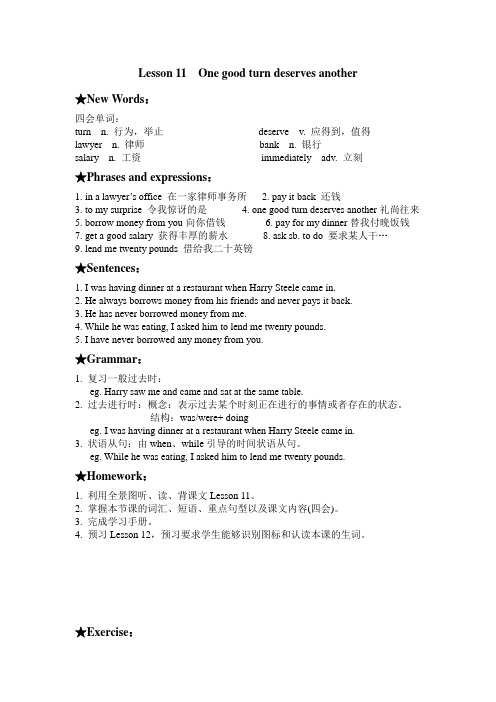
Lesson 11 One good turn deserves another★New Words:四会单词:turn n. 行为,举止deserve v. 应得到,值得lawyer n. 律师bank n. 银行salary n. 工资immediately adv. 立刻★Phrases and expressions:1. in a lawyer’s office 在一家律师事务所2. pay it back 还钱3. to my surprise 令我惊讶的是4. one good turn deserves another礼尚往来5. borrow money from you向你借钱6. pay for my dinner替我付晚饭钱7. get a good salary 获得丰厚的薪水8. ask sb. to do 要求某人干…9. lend me twenty pounds 借给我二十英镑★Sentences:1. I was having dinner at a restaurant when Harry Steele came in.2. He always borrows money from his friends and never pays it back.3. He has never borrowed money from me.4. While he was eating, I asked him to lend me twenty pounds.5. I have never borrowed any money from you.★Grammar:1. 复习一般过去时:eg. Harry saw me and came and sat at the same table.2. 过去进行时:概念:表示过去某个时刻正在进行的事情或者存在的状态。
结构:was/were+ doingeg. I was having dinner at a restaurant when Harry Steele came in.3. 状语从句:由when、while引导的时间状语从句。
新概念英语二册L1分析
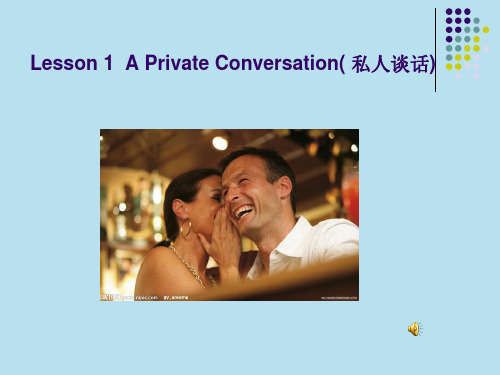
New words
private
/ 5praIvIt/
adj. 私人的
conversation /7kCnv[5seIF[n/ n.
谈话
theatre
/5WI[t[/
n. 剧场,戏院
seat
/si:t/
n. 座位
play
/pleI/
What did the young man say to the writer?
Listen ,repeat and answer
Q1: Where did the writer go last week?
Q2: Why didn’t he enjoy the play?
A private conversation
adj. 令人兴奋的 adj. 兴奋的 adj. 令人吃惊的 adj. 感到吃惊的 adj. 令人放松的 adj. 放松的
Article focuses
5. look, see, watch的用法:
look vi. 看
look at… 看……
see vt. 看见
watch vt. 观看
eg: I looked at the young man and the ng
woman angrily.
Did you see Sam yesterday?
She’s watching TV.
Article focuses
6. hear vt. 听见
listen vi. 听
listen to … 听……
eg: I can’t hear the actors.
He’s not listening to me.
新概念英语第二册L1 A private conversation

Multiple choice questions
9. He was a young man. He wasn‟t very ______. a. old b. big c. tall d. large
Multiple choice questions
10. The writer looked at the man and the woman angrily. He was very ______. a. sad b. unhappy c. cross d. pleased
Multiple choice questions
3. Last week the writer went to the theatre. He was ______ the theatre. a. to b. at c. into d. on
Multiple choice questions
4. The young man and the young woman were sitting behind him. He was sitting ______ them. a. before b. above c. ahead d. in front of
say
say vt. + 说的内容 say sth. 说些什么 e.g.他什么也没说。 He said nothing. “多么好的一天!”他说。 “What a lovely day,” he said.
speak
speak vt. 讲话,讲语言
speak a foreign language 讲一门外语 speak Chinese 讲中文 speak English 讲英语 speak to sb. 同某人讲话
新概念英语第2册教学课件 L11

中国戏曲学院 国交系 周欣 2014. 3
One good turn deserves another 礼尚往来
• I was having dinner at a restaurant when Tony Steele came in. • Tony worked in a lawyer's office years ago, but he is now working at a bank. • He gets a good salary, but he always borrows money from his friends and never pays it back. • Tony saw me and came and sat at the same table. • He has never borrowed money from me. • While he was eating, I asked him to lend me twenty pounds. • To my surprise, he gave me the money immediately. • 'I have never borrowed any money from you,' Tony said, 'so now you can pay for my dinner!'
中国戏曲学院 国交系 周欣 2014. 3
New words and expressions
• Tony saw me and came and sat at the same table.
– 一个主语带不同的谓语,用连词and连接,表示动作连续进行。 这种句子是简单句。 – 哈利看到我,走过来和我坐在同一个桌旁。 • 对比:
新概念英语第二册第一课 详细版
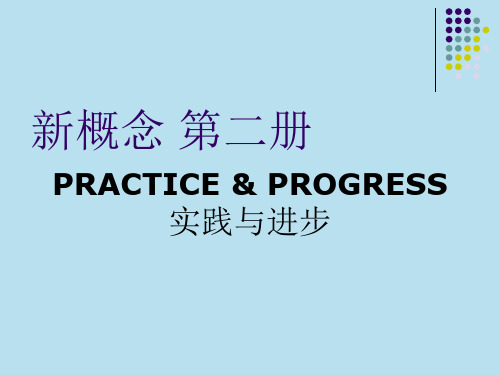
bear hug热情的拥抱
11. business ① n. 生意
business man 生意人
do business 做生意
go to some places on business因公出差
②n.某人自己的私人事情
6. He had a good seat. He was sitting in a good( ).
A. chair b. place c. armchair d. class 7. He was a young man. He wasn’t very ( ) A. old b. big c. tall. d. large 8. The writer looked at the man and the woman
looked at ( )angrily. A. them b. they c. their d. us 5. The young man and the young woman paid ( )
attention to the writer. A. none b. any c. not any d. no
the children, quietly 5.quietly, the door, he, opened 6. immediately, left, he
7. a tree, in the corner of the garden, he, planted
8. before lunch, the letter, in his office, quickly, he, read,
behind the times 落伍, 赶不上潮流 eg. I am sorry to say, my dear, your clothes are a bit behind the
新概念第二册L11知识要点总结
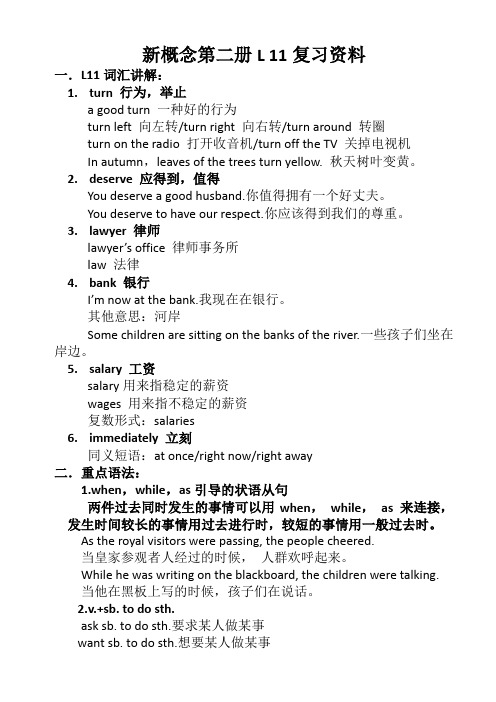
新概念第二册L 11复习资料一.L11词汇讲解:1.turn 行为,举止a good turn 一种好的行为turn left 向左转/turn right 向右转/turn around 转圈turn on the radio 打开收音机/turn off the TV 关掉电视机In autumn,leaves of the trees turn yellow. 秋天树叶变黄。
2.deserve 应得到,值得You deserve a good husband.你值得拥有一个好丈夫。
You deserve to have our respect.你应该得到我们的尊重。
wyer 律师lawyer’s office 律师事务所law 法律4.bank 银行I’m now at the bank.我现在在银行。
其他意思:河岸Some children are sitting on the banks of the river.一些孩子们坐在岸边。
5.salary 工资salary用来指稳定的薪资wages 用来指不稳定的薪资复数形式:salaries6.immediately 立刻同义短语:at once/right now/right away二.重点语法:1.when,while,as引导的状语从句两件过去同时发生的事情可以用when,while,as 来连接,发生时间较长的事情用过去进行时,较短的事情用一般过去时。
As the royal visitors were passing, the people cheered.当皇家参观者人经过的时候,人群欢呼起来。
While he was writing on the blackboard, the children were talking.当他在黑板上写的时候,孩子们在说话。
2.v.+sb. to do sth.ask sb. to do sth.要求某人做某事want sb. to do sth.想要某人做某事help sb. to do sth. 帮助某人做某事teach sb. to do sth. 教某人做某事advise sb. to do sth. 建议某人做某事allow sb. to do sth.允许某人做某事order sb. to do sth.命令某人做某事prefer sb. to do sth.宁愿某人做某事wish sb. to do sth.希望某人做某事三.重点短语:1.borrow sth. from sb.向某人借某物He has never borrowed money from me.他从来没跟我借过钱。
新概念英语第二册Lesson 1

(4)true→truly
7.attention n. pay attention to sth. pay more attention to 给予更多的注意
例句:Parents should pay more attention to their children’s handwriting. draw one’s attention 吸引...注意力 例句:The new computer draws our attention.
Lesson 1
A private conversation
1.private
(1)adj . 私人的 a private company
['sekrətəri] a private secretary 私人秘书
例句:That is for your private ear. 这是说给你一个人的秘密。
(2)n. 私事,私人 例句:It's none of your business! This is my private!
1.private (3)私下地 in private=in secret [ˈsiːkrət] 例句:Miss Li is our teacher,but she is very kind in private.
其他的事情: thing 表示任何的事情, 如everything ,anything matter : What’s the matter with you? business强调职责(自己的私事) It’s none of your business.
简单的陈述句: 主+谓+宾+方式状语+地点状语+时间状语 He left Beijing last year.
新概念英语第二册 L1

Watch and answer this question: Q: Did the writer enjoy the play or not?
Watch again and answer this question: Q: why did the writer complain to the people behind him? A: Because they were laling loudly. The writer
1. Don't ___ fire if you don't want to get burnt . A. play B. play with C. play at D. play in 2. The old man was very angry_____the two young people in the theatre . A.at B. with C. for D. about 3 . you'd better stop talking about this matter .this is none of your ______anyhow A. matter B. thing C. affair D. business 4 . the little girl can't ___such a treatment (待遇 )A. bear B. put C. wait D. understand
• Last week I went to the theatre. I had a very good seat. The play was very interesting. I did not enjoy it. A young man and a young woman were sitting behind me. They were talking loudly. I got very angry. I could not hear the actors. I turned round. I looked at the man and the woman angrily. They did not pay any attention. In the end, I could not bear it. I turned round again. 'I can't hear a word!' I said angrily. 'It's none of your business,' the young man said rudely. 'This is a private conversation!'.
新概念英语第二册_lesson_1

business
[作n.] 事情 thing 泛指事情 matter 一般指麻烦的事情 What‟s the matter? business 私人事情 It„s none of my business. affair 事务、事件(较正式) international affairs, love affairs
privation n.丧失;缺乏 privacy n.隐私
[重要词组] in private/public 译:我可以私下同你谈谈吗? Can I speak to you in private? [同义词] personal 个人的 PS: Personal Statement 个人陈述 PA: Personal Assistant 个人助理
[语言点2] young adj., man n. 形容词 修饰名词作定语。请注意它的位置,一 般放在被修饰的名词之前,但如果是介 词短语、形容词短语或修饰名词的从句 则放在被修饰名词之后。
比如: a man in the room(介词短语) 在房间里的一个男人。 Is it a problem difficult to solve (形容词短语)? 这是个难解决的问题吗?
1. Last week I went to the theatre. [参考翻译] 上个星期,我去了戏院看戏。 [语言点1]时间状语+主语+谓语动词+地点 状语 固定短语:go to the theatre [语言点2] 在theatre,cinema,pictures等词 之前一定要加定冠词the。
② enjoy doing enjoy swimming 喜欢游泳, enjoy fishing喜爱钓鱼 ③ 一般不可说enjoy sb This morning I enjoyed my English teacher. 但enjoy oneself是个例外! 比如请客人吃菜时: Enjoy yourself!
- 1、下载文档前请自行甄别文档内容的完整性,平台不提供额外的编辑、内容补充、找答案等附加服务。
- 2、"仅部分预览"的文档,不可在线预览部分如存在完整性等问题,可反馈申请退款(可完整预览的文档不适用该条件!)。
- 3、如文档侵犯您的权益,请联系客服反馈,我们会尽快为您处理(人工客服工作时间:9:00-18:30)。
Lesson 1
new words
• private adj.私人的 私人的
eg: private car 私家车 private life:私生活 (反义词)public adj.公共的 privacy n.隐私
• conversation n.谈话 谈话
比较正式一些
have a conversation talk可以正式,也可以私人的 dialogue:对话 chat: 闲聊 gossip: 嚼舌头
• 过去进行时: 过去进行时:
was/ were + v.ing
标志性单词: 标志性单词: at that moment, when, while, 】
简单陈述句的语序
He looks at a dog.
s. v. o. (宾语是动作的承受者) 宾语是动作的承受者)
v.玩、踢、打 eg: play football playboy
• loudly adv. 大声地
eg: The man speaks loudly. loud adj.
• angry adj. 生气的
=cross adj. 生气的 (反义词)happy be blue in the face angry with sb. angry at sth.
• 7、 In the end 、
In the end = at last =finally 最后,终于
• 8、 It’s none of your business. 、
None 相当于not any 或no one 但语气较强。 None of 这个短语有时可以表达一种断然、甚至粗暴的口 气,尤其是在祈使句中: None of your silly remarks!别说 傻话了! None of the students can answer this question.其中没有 一个 one of my students can answer this question.其中之一 Some of the students are playing.其中一些
• theatre n.剧场,戏剧 剧场, 剧场 theater (美)
eg: go to the theatre 去看戏 cinema: 电影院
• seat
n.座位 座位
have a good seat take a seat : 就座 sit vi. sit down坐下
• play n.戏 戏
• angrily adv. 生气的 • attention n. 注意 v. 立正 attention, please!
pay attention (to):注意 You must pay attention to that girl.
pay a little attention : 稍加注意 pay much attention : 多加注意 pay more attention : 更多注意 pay close attention: 密切注意 pay no attention : 不用注意
• 现在进行时: 现在进行时:
is/am/are + v.ing v.ing : a. play--- playing b. live--- living c. put--- putting d. lie--- lying now, at the moment, look, listen等 等
标志性单词: 标志性单词:
•
3、I did not enjoy it. 、
①enjoy+n. 喜欢 从当中得到一种享受(后边不能跟人) I enjoyed the food very much. ②enjoy oneself/代词 玩的开心 We always enjoy ourselves ③enjoy+动名词 Jane doesn’t enjoy swimming. She enjoys going to the theatre.
• 4、I could not hear the actors. 、
hear listen
vt. 被动的听 vi. 主动的听
• 5、I turned round.转身 、 转身
Turn round = turn around
• 6、They didn’t pay any attention. 、
区别: 区别:any :用于否定和疑问句中 some :用于肯定句 共同点:既可以修饰可数名词又可以修饰不可数名词 共同点:
反义词politely rude adj.
A private conversation
【课文讲解】 课文讲解】 • 1、Last week I went to the theatre. 、 Go to the cinema = see a film 去电影院看电影 2、The play was very interesting. 、 interest n. 1.兴趣2.利息 interesting adj. 和 interested adj.的区别:
a. I am interested in the play. ____ b. The play is very _____ interesting . interesting book. c. It is an _____ d. He is an _____ interesting boy. 表结构:主语是人用ed 主、系、表结构:主语是人用 主语是物用ing 主语是物用 做定语是只能用ing 做定语是只能用
He looks ill.
s. l. p. (表语是修饰说明主语) 表语是修饰说明主语)
He is reading the book carefully in the garden now.
s. v. o. 方式adv. 地点adv. 时间 adv.
He s. • • • • • •
is playing football v. o.
• 一般过去时: 一般过去时:
1. be (was/ were) 2. v.过去式 过去式 v.过去式规则变化: 过去式规则变化: 过去式规则变化 a. play---played b. study---studied c. stop---stopped d. live---lived 3. 情态 过去式 +v.原形 情态v.过去式 原形 标志性单词: 标志性单词: yesterday, the day before yesterday, last week, 2 days ago, 等
新概念第二册
NEW CONCETP ENGLISH BOOK 2
review
• 一般现在时: 一般现在时:
•
1. Be (is/ am/ are) 2. v. (当主语是第三人称单数) 当主语是第三人称单数) 当主语是第三人称单数 a. live--- lives b. (以s, sh,ch,x,o结尾 结尾+es) go--- goes 以 结尾 c. (辅音字母 结尾,去y+ie) study---studies 辅音字母+y结尾 结尾, ) d. have---has 3. 情态 + v. 原形 情态v. 标志性单词: 标志性单词: often, usually, always, sometimes, everyday, on Sundays, frequently, rarely等 等
• bear (bore, borne) v. 容忍
=stand /put up with bear n. 熊 bear hug: 热情的拥抱
• business n. 事
business man :生意人 do business: 做生意 on business 出差
• rudely adv. 无礼地,粗鲁地 无礼地,
happily adv. (how)
on the playground now adv. (where) adv. (when)
1 ---主语s.(一般有名词或代词构成)放谓语前。 (一般有名词或代词构成)放谓语前。 2 ---谓语v.由动词充当 系L 由动词充当---系 由动词充当 3 ---宾语o.:放在动词和介词后 表语 放在动词和介词后---表语 放在动词和介词后 表语P 4 ---方式状语adv.,修饰谓语。 修饰谓语。 修饰谓语 5 ---地点状语adv. 6 ---时间状语adv.,可以放在句首或句末 可以放在句首或句末
